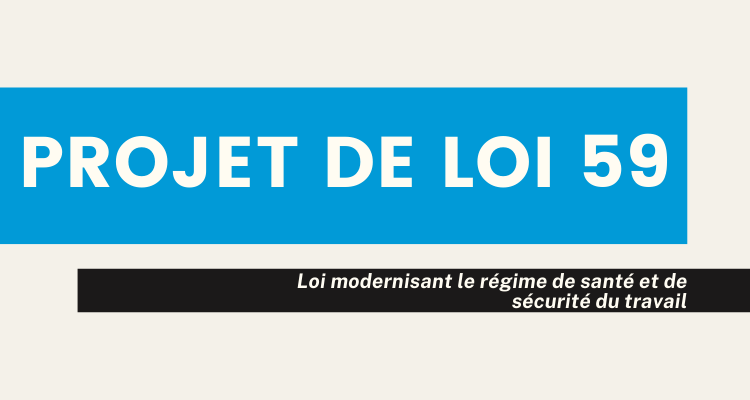
The historic demands of the FIQ and FIQP in occupational health and safety are partly heard, but a bill that still needs to be significantly improved.
The Fédération interprofessionnelle de la santé du Québec-FIQ and FIQP | Secteur privé are demanding that the Minister of Labour, Jean Boulet, ensure that no rollback on the healthcare professionals’ rights will be tolerated. Delays caused by historical disinterest in the implementation of modern protection measures and under estimating the risks of caregiving work, a sector predominantly female, must be met by the swift adoption of all the recommendations contained in the Federations’ brief, especially in regard to the recognition of psychological illnesses. Moreover, the decision to apply all the prevention mechanisms to the health sector will finally allow us to set the stage for establishing a culture of prevention in the health and social services setting, whose weaknesses have been widely exposed since the beginning of the COVID-19 pandemic. The Federations are warning the government that they will remain vigilant to ensure the protection of workers who are victims of domestic and family violence.

BRIEF Bill No. 59 – An Act to modernize the occupational health and safety regime
Monitoring workers’ rights
Modernizing the occupational health and safety regime is essential to take into account demands for better consideration of women’s rights. Although some progress has been made, the government must ensure rolling out all efforts to better protect victims of domestic violence, as well as for pregnant or breastfeeding women. The Federations undertake to monitor the rollout of these measures:
· The introduction of the obligation for employers to take measures to ensure worker protection in situations of physical or psychological violence including domestic and family violence. But this obligation will need to be accompanied by robust training to properly equip employers;
· In regards the preventive withdrawal of the pregnant or breastfeeding worker, the provincial standardization of protocols for identifying hazards and associated conditions of employment is a step forward. The new protocols will nevertheless have to be developed taking into account the precautionary principle and will have to draw on best practices currently in place.
The health and social services sector: an at-risk work environment
The obligation for the health and social services sector to implement all the prevention measures is a major step forward for the Federations who have been demanding it. Magnified during the pandemic, the lack of training in the prevention of infectious diseases, lack of personal protective equipment reserves, canceling time off or mandatory overtime are only a few examples which put the healthcare professionals at risk for infection and burnout.
“We would have hoped that we would no longer have to demonstrate that hospitals are at-risk work environments for healthcare professionals. The extent of the problems encountered and the health and safety hazards observed there, even only the risks of contamination in times of a pandemic and the risk of physical or psychological aggression do not correspond to a low risk work environment. This distinction denies the issues in the network that have been widely documented over the years. It’s obvious that all the prevention mechanisms must be rolled out consistently and quickly in all sectors of activities in the health and social services network. We must avoid making the same mistakes again at all costs.”, explained Linda Lapointe, Vice-President of the FIQ, Occupational Health and Safety.
Advocating for recognition of depression as an occupational disease
With regard to the overhaul of An Act respecting industrial accidents and occupational diseases (AIAOD), the bill currently stipulates that the list of occupational diseases would be designated by regulation in the future, giving more flexibility to the review mechanisms. Nevertheless, the FIQ wants to point out that the coercive working conditions imposed on healthcare professionals, unsafe ratios, MOT, challenges linked to a more vulnerable clientele and those of the COVID-19 pandemic have resulted in putting them at higher risk of developing an adjustment disorder or depression. Lastly, the recognition of post-traumatic stress as a recognized occupational disease attests to the advances in society and science.
“It’s not a good idea for the minister to miss the boat on the recognition of psychological occupational diseases, especially in a context where the government is initiating a broad consultation on mental health issues related to the pandemic. The healthcare professionals have front-row seats for attesting to the negative impacts on their psychological well-being linked to the work overload because of COVID-19. Given the situation, healthcare professionals’ mental health risks must be at the top of the list of priorities for this new version of the AIAOD in order to send a clear signal of the urgency and importance of this issue so action can be taken now.” declared Linda Lapointe.
Avoiding that the law is detrimental to healthcare professionals is still possible
To avoid setbacks for the rights of healthcare professionals with employment injuries, the Federations insist that the government review its bill and include the following aspects:
· Maintain the preponderance of the attending physician’s opinion in several provisions of the bill, as only he can take into account the specific context of the healthcare professionals’ work environment, offering better protection for workers’ health and safety.
· Remove the new definition of suitable job (employment) which is detrimental for healthcare professionals, to the extent that this change jeopardizes the achievement of the desired objective of determining a job that a worker can reasonable hold when she has functional limitations which prevent her from returning to her pre-injury job. The Federations recommend maintaining the definition of a suitable job that is currently in effect.